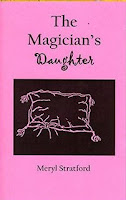What inspired you to write these poems?
Elegy with Backward Clocks was written at the end of daylight savings time, when we turn our clocks back an hour. This is a What if? poem, imaging we really could save some time now to use at a later date, a fantasy that becomes ever more attractive as one grows older. It’s also a list poem, enacting the ritual of going around the house finding all the clocks that must be turned back, having fun naming all the different kinds of clocks. The music of the poem echoes some phrases from a half-remembered poem by Dylan Thomas.
In Black & White was written in a workshop with Carolyn Forche at the Atlantic Center for the Arts. It’s an ekphrastic poem, inspired, as the poem says, by a (large) black and white photograph of a foot in a ballet slipper, which I saw in a photo exhibit in the visitor reception center. I was playing with the idea of synecdoche, a figure of speech in which a part is made to represent the whole, and I liked the idea of that foot representing the entire art of ballet, so the phrase one had to imagine became part of the music of the poem. When I realized that I had written about everything in the photo except the floor, I stumbled upon the ending, since the floor is at the bottom of the photo and also at the bottom, or end, of the poem.Which poets inspire you?
My desert island books would be: The Complete Works of William Shakespeare, Emily Dickinson, and Rainer Maria Rilke. That said, I tend to fall in love with a different poet every week. I have a large and ever-growing library of poetry books. I believe is reading widely, old and new, traditional and experimental, English and translations from other languages, to find what you love. I believe in reading deeply, rereading the books you love until you know them by heart, until they fall apart in your hands.Why do you enjoy writing?
Poetry is the place where outer and inner worlds meet, a compression of everything we know about real and imaginary worlds, every emotion we feel as sentient beings. Poetry is always playful, even when it speaks of serious things. It has myriad forms, infinite possibilities for combining and recombining words.
| Elegy with Backward Clocks | In Black and White |
|---|---|
| The clocks have fallen back. The white clock ticking on the kitchen wall, the antique clock in the living room. They've fallen back as leaves fall, as darkness falls earlier each night. The bedside alarm with its shrill voice and luminous face, the pocket watch, the cuckoo clock with raucous bird and Bavarian dancers. After the fiction of saving daylight, we've returned to facts. Once we rose with the sun, marked time by its shifting shadow. Now we have clocks. Now we have months instead of moons. We've abandoned the fantasy that we could save some of the daylight, even an hour of it. That we could live our evenings in the light of the past, borrow light from the past to postpone for awhile the coming of darkness. These autumn days would last forever if we called them by another name. |
I saw a photograph of a foot in a satin slipper, ribbon wrapping an ankle, the curve of a leather sole. Such slippers are hand-stitched by artisans, neither right nor left. Dancers batter them as they batter their own bodies into impossible beauty. I remember my first pair of pointe shoes, the diva glamour of them, and the truth, toes wrapped in lamb's wool, bleeding and bruised. Russian noblemen drank champagne from slippers such as these. The foot in the photograph was at the point of balance. One had to imagine the muscled leg pulling upward into the solar plexus, into the supple spine. One had to think of horses running on tiptoe. The foot was alone. It was the feather without the bird, the fin without the shark, fragments of Sappho suggesting a body of poetry. One had to imagine the dancer, hair pulled back, thin band of elastic round her waist to guide her partner's fingertips, Swan Queen or Sugar Plum or fourth girl on the left in a corps de ballet, music flowing through her. Don't tell me about the weaker sex. She would starve herself for her art. It was a photo of a foot in a slipper poised on a marble floor. |
Reprinted with permission from author. Poems are available in chapbook:
Stratford,Meryl. The Magician's Daughter. Florida: Yellow Jacket Press, 2013, Print. |
|

No comments:
Post a Comment